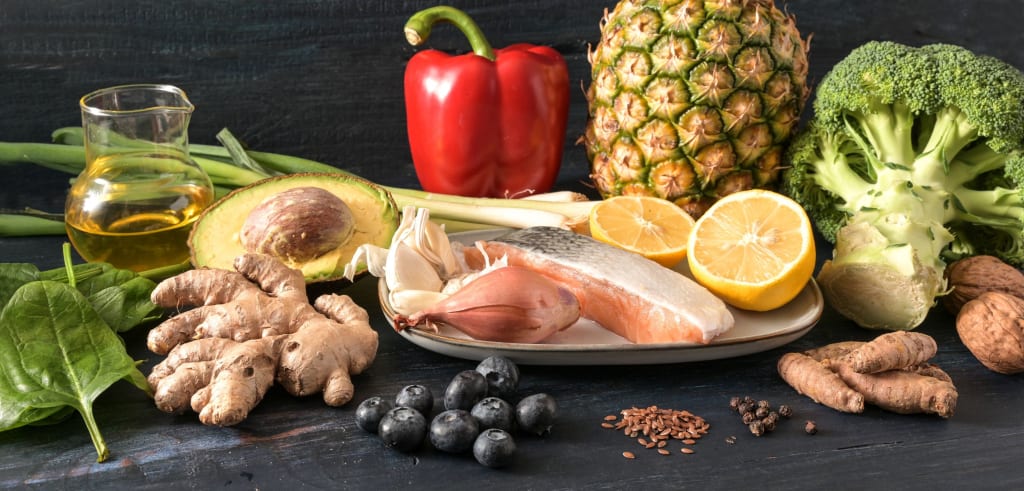Foods that Fight Inflammation
Understanding inflammation

1. Introduction
2. Understanding inflammation
3. The role of diet in inflammation
4. Anti-inflammatory foods
• Turmeric
• Ginger
• Berries
• Fatty fish
• Leafy greens
5. Herbs and spices with anti-inflammatory properties
• Garlic
• Cinnamon
• Rosemary
• Thyme
6. Healthy fats and oils
• Olive oil
• Avocado
• Nuts and seeds
7. Foods rich in antioxidants
• Dark chocolate
• Green tea
• Citrus fruits
8. The importance of a balanced diet
9. Avoiding inflammatory foods
10. Lifestyle factors for reducing inflammation
11. The role of exercise
12. Stress management and inflammation
13. Conclusion
Foods that Fight Inflammation
Inflammation is a natural response of the body's immune system to protect against injury and infection. However, chronic inflammation can lead to various health issues, including heart disease, diabetes, and arthritis. While medications can help manage inflammation, incorporating certain foods into your diet can also play a crucial role in fighting inflammation naturally. In this article, we will explore a range of foods that have anti-inflammatory properties and discuss how they can contribute to your overall well-being.
Introduction
Inflammation is a complex biological process that involves the activation of the immune system to fight off harmful stimuli. It can be acute, occurring as a short-term response to injury or infection, or chronic, persisting over an extended period. Chronic inflammation has been linked to numerous health problems, and adopting an anti-inflammatory diet can be an effective strategy to mitigate its effects.
Understanding inflammation
Before delving into the specifics of anti-inflammatory foods, it's important to understand the underlying mechanisms of inflammation. When the body recognizes a threat, such as an injury or infection, immune cells release chemicals that promote blood flow to the affected area. This results in redness, heat, swelling, and pain—classic signs of inflammation. While acute inflammation is necessary for healing, chronic inflammation can damage healthy tissues and organs.
The role of diet in inflammation
Research has shown that certain foods can either promote or reduce inflammation. A diet high in processed foods, refined sugars, unhealthy fats, and excessive alcohol has been associated with increased inflammation in the body. On the other hand, a diet rich in whole foods, including fruits, vegetables, whole grains, lean proteins, and healthy fats, can help combat inflammation and promote overall health.
Anti-inflammatory foods
1. Turmeric: Turmeric contains a compound called curcumin, which has potent anti-inflammatory properties. It has been used for centuries in traditional medicine to treat various inflammatory conditions. Adding turmeric to your dishes or consuming turmeric supplements can help reduce inflammation in the body.
2. Ginger: Ginger is another spice with remarkable anti-inflammatory effects. It contains gingerol, a bioactive compound that has been shown to inhibit the production of inflammatory chemicals in the body. Adding fresh ginger to teas, stir-fries, or smoothies can provide an extra anti-inflammatory boost.
3. Berries: Berries, such as strawberries, blueberries, and raspberries, are packed with antioxidants that combat inflammation. They are also rich in fiber, which promotes gut health—an essential factor in reducing inflammation. Including a variety of berries in your diet can provide a flavorful and nutritious way to fight inflammation.
4. Fatty fish: Fatty fish like salmon, mackerel, and sardines are excellent sources of omega-3 fatty acids, which have been shown to have anti-inflammatory effects. These fatty acids help reduce the production of inflammatory compounds and promote heart health. Aim to include fatty fish in your diet at least twice a week.
5. Leafy greens: Dark, leafy greens such as spinach, kale, and Swiss chard are rich in antioxidants and other anti-inflammatory compounds. They also provide essential vitamins and minerals that support overall health. Including a generous portion of leafy greens in your meals can contribute to an anti-inflammatory eating pattern.
Herbs and spices with anti-inflammatory properties
1. Garlic: Garlic not only adds flavor to your dishes but also contains sulfur compounds with anti-inflammatory properties. These compounds help reduce inflammation in the body and support the immune system. Including garlic in your cooking can be a simple yet effective way to enhance the anti-inflammatory benefits of your meals.
2. Cinnamon: Cinnamon is a warm spice known for its sweet aroma and distinctive flavor. It contains cinnamaldehyde, a compound with potent anti-inflammatory properties. Sprinkling cinnamon on your oatmeal, adding it to baked goods, or enjoying it in a cup of warm tea can provide both flavor and anti-inflammatory benefits.
3. Rosemary: Rosemary is a fragrant herb commonly used in cooking. It contains rosmarinic acid, a compound known for its anti-inflammatory and antioxidant effects. Adding fresh rosemary to roasted vegetables, marinades, or homemade dressings can not only enhance the taste but also contribute to an anti-inflammatory diet.
4. Thyme: Thyme is a versatile herb with a distinct flavor profile. It contains an array of antioxidants and anti-inflammatory compounds. Incorporating thyme into your dishes, such as soups, stews, or roasted meats, can add depth of flavor while providing anti-inflammatory benefits.
Healthy fats and oils
1. Olive oil: Olive oil is a staple in Mediterranean cuisine and is widely recognized for its health benefits. It contains monounsaturated fats, which have been shown to reduce inflammation and promote heart health. Using olive oil as your primary cooking oil or dressing can be a simple way to introduce anti-inflammatory fats into your diet.
2. Avocado: Avocado is a creamy fruit packed with healthy fats, fiber, and antioxidants. It contains monounsaturated fats, similar to those found in olive oil, which have been associated with reduced inflammation and improved metabolic health. Adding avocado slices to salads, spreading avocado on toast, or blending it into smoothies can be delicious ways to incorporate this anti-inflammatory food into your meals.
3. Nuts and seeds: Almonds, walnuts, flaxseeds, and chia seeds are examples of nuts and seeds that are rich in healthy fats and antioxidants. They have been shown to have anti-inflammatory effects and may help lower the risk of chronic diseases. Snacking on a handful of nuts or adding seeds to your yogurt or oatmeal can provide a satisfying crunch and an anti-inflammatory boost.
Foods rich in antioxidants
1. Dark chocolate: Good news for chocolate lovers! Dark chocolate with a high percentage of cocoa contains flavonoids, which are powerful antioxidants. These antioxidants can reduce inflammation and improve heart health. Enjoying a small piece of dark chocolate as an occasional treat can provide both pleasure and potential health benefits.
2. Green tea: Green tea is well-known for its antioxidant properties. It contains catechins, which have been shown to reduce inflammation and protect against certain chronic diseases. Drinking green tea regularly can be a soothing and healthful addition to an anti-inflammatory lifestyle.
3. Citrus fruits: Citrus fruits like oranges, lemons, and grapefruits are packed with vitamin C and other antioxidants. These nutrients help combat inflammation and support the immune system. Squeezing fresh lemon juice over salads, enjoying a juicy orange as a snack, or incorporating citrus flavors into your recipes can add a refreshing and anti-inflammatory twist to your meals.
The importance of a balanced diet
While incorporating specific anti-inflammatory foods into your diet can be beneficial, it's crucial to emphasize the importance of a balanced eating pattern. A varied diet that includes a wide range of fruits, vegetables, whole grains, lean proteins, and healthy fats provides essential nutrients and supports overall health. Strive for balance and moderation in your food choices to promote long-term well-being.
Avoiding inflammatory foods
In addition to including anti-inflammatory foods, it's equally important to avoid or limit foods that promote inflammation. Highly processed foods, sugary snacks and beverages, refined carbohydrates, and excessive consumption of red meat and processed meats have been linked to increased inflammation in the body. Being mindful of your food choices and opting for whole, unprocessed options can help create an anti-inflammatory eating plan.
Lifestyle factors for reducing inflammation
In addition to diet, certain lifestyle factors can contribute to reducing inflammation:
1. The role of exercise: Regular physical activity has been shown to reduce inflammation and improve overall health. Engaging in activities like brisk walking, jogging, cycling, or strength training can help keep inflammation at bay.
2. Stress management and inflammation: Chronic stress can contribute to increased inflammation in the body. Implementing stress-reducing techniques such as meditation, deep breathing exercises, or engaging in hobbies can help lower inflammation levels and improve overall well-being.
Conclusion
Incorporating foods that fight inflammation into your diet can have significant health benefits. A diet rich in anti-inflammatory foods, including turmeric, ginger, berries, fatty fish, leafy greens, herbs, and spices, healthy fats and oils, and foods rich in antioxidants, can help reduce chronic inflammation and promote overall well-being. Additionally, adopting a balanced eating pattern, avoiding inflammatory foods, and considering lifestyle factors like regular exercise and stress management can further support your anti-inflammatory efforts.
FAQs
1. Can I take supplements instead of incorporating anti-inflammatory foods into my diet?
While supplements can be beneficial in certain cases, it's generally recommended to obtain nutrients from whole foods whenever possible. Whole foods provide a variety of nutrients and compounds that work synergistically to support health. However, if you have specific dietary restrictions or medical conditions, it's best to consult with a healthcare professional or registered dietitian to determine if supplements are necessary.
2. How long does it take to see the effects of an anti-inflammatory diet?
The effects of an anti-inflammatory diet can vary from person to person. Some individuals may experience improvements in symptoms within a few weeks, while others may take longer. Consistency is key, and it's important to adopt an anti-inflammatory lifestyle as a long-term approach to overall health.
3. Are there any side effects associated with anti-inflammatory foods?
In general, anti-inflammatory foods are safe and well-tolerated. However, individual sensitivities or allergies can occur. If you notice any adverse reactions after consuming specific foods, it's advisable to discontinue their consumption and consult with a healthcare professional.
4. Can children benefit from an anti-inflammatory diet?
Absolutely! An anti-inflammatory diet can benefit individuals of all ages, including children. In fact, promoting healthy eating habits from a young age can set the foundation for a lifetime of good health. Encouraging children to consume a variety of fruits, vegetables, whole grains, and lean proteins can contribute to their overall well-being.
5. Can an anti-inflammatory diet replace medication for inflammatory conditions?
While an anti-inflammatory diet can support overall health and complement medical treatment, it should not be considered a substitute for prescribed medication. If you have a diagnosed inflammatory condition, it's important to follow the advice of your healthcare provider and take any prescribed medications as directed.
About the Creator
Latif Khan
Our page is Motivated,Arts,Excited and Indifferent.In this page, our Article is about Health,Food,Fashion,Humanity,Exercise,Social activity,Society etc
Thanks for watching and your support our articles in my page






Comments
There are no comments for this story
Be the first to respond and start the conversation.